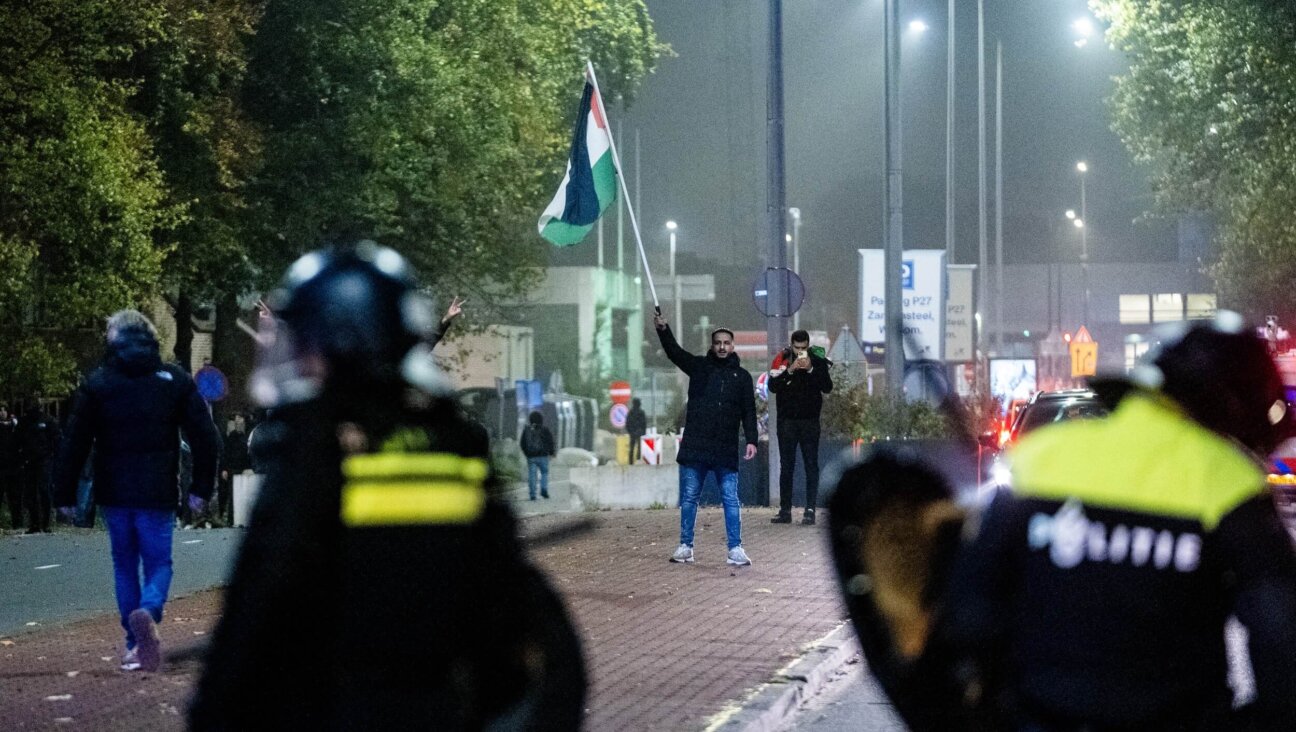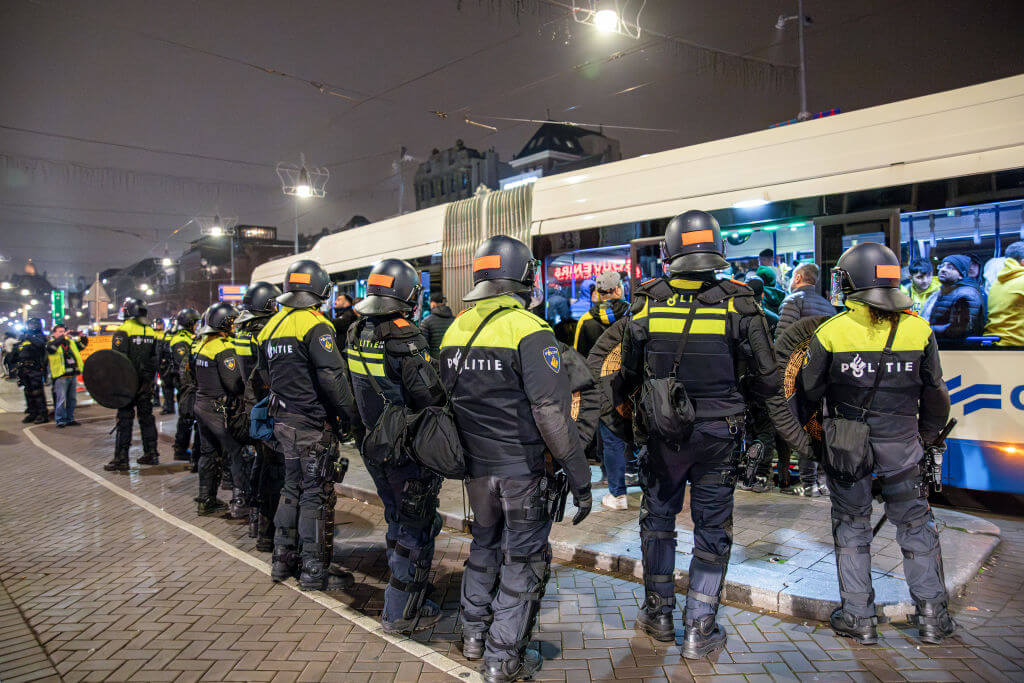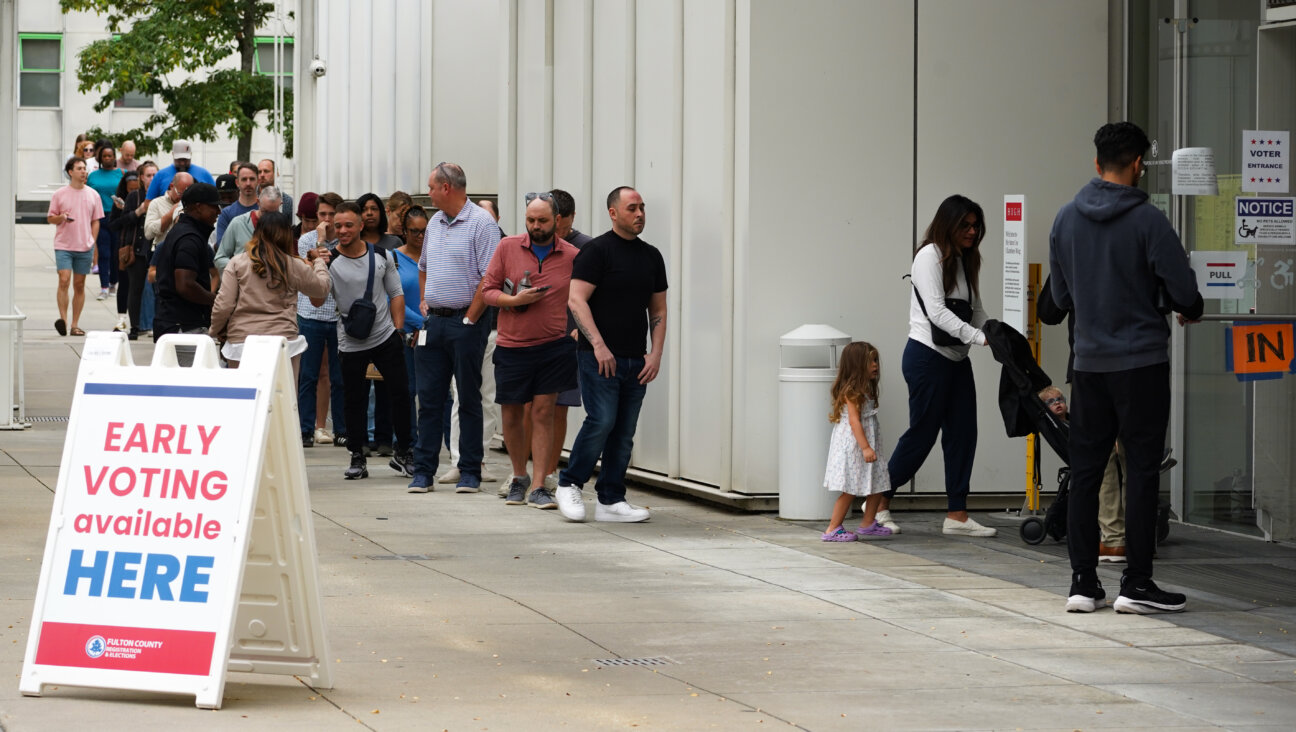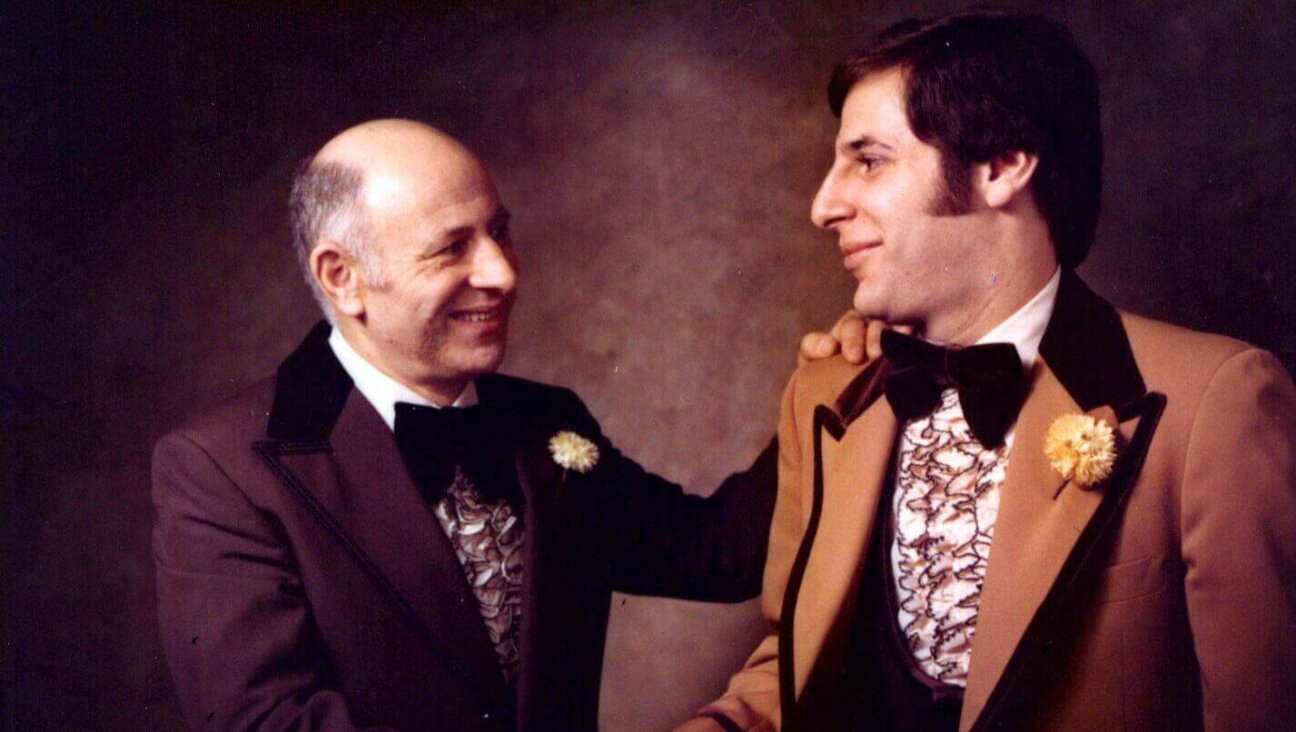The IDF freed 2 hostages — recovering the rest must be their top priority
As questions mount over Israel’s military strategy, the successful rescue is a reminder of what its true focus should be
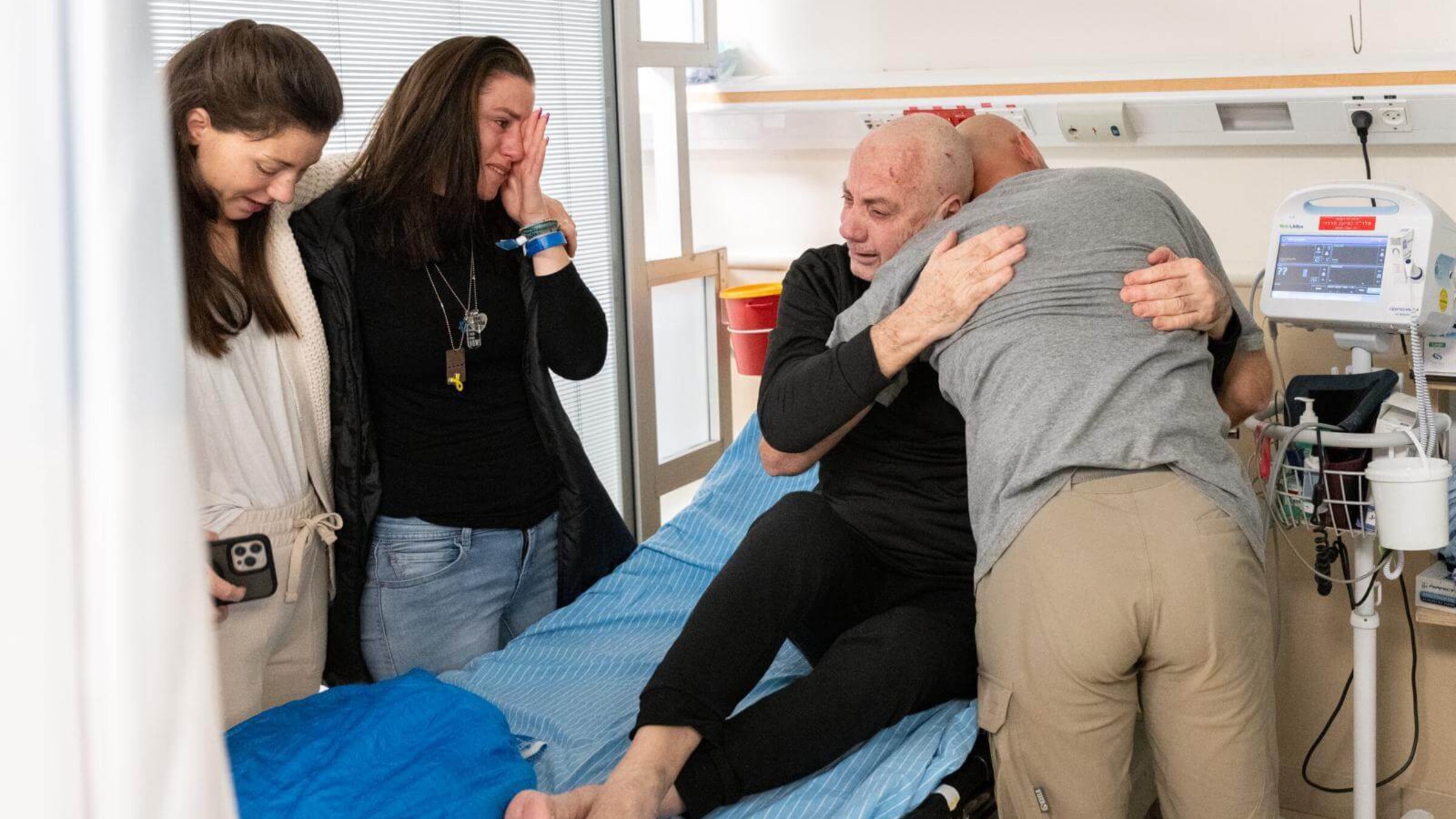
Rescued hostage Louis Har, reuniting with his loved ones in Israel on Monday. Courtesy of Israel Defense Forces
As a new week began the Jewish people received news of a miracle.
Israel rescued two hostages early Monday morning: 60-year-old Fernando Simon Marman and 70-year-old Louis Har. The two were being held in Rafah, a city in southern Gaza where more than a million Palestinians have sought shelter from Israel’s ongoing military campaign.
Israel completed the rescue, which involved a ground operation and airstrikes, at great cost. The city of Rafah is crowded, and urban warfare is difficult. At least 67 Palestinians were reported dead by the Hamas-run Gaza Health Ministry as a result of the nighttime raid.
The mission was a remarkable success for Israel, where frustration over the difficult process of freeing hostages has mounted, including in the wake of Prime Minister Benjamin Netanyahu’s rejection, last week, of another proposed deal for a hostage release combined with an extended ceasefire and prisoner release.
And yet, the situation remains untenable.
Israel is fighting a war with two stated objectives: freeing the hostages and toppling Hamas. Yet those goals are often at odds, not least because the goal of defeating Hamas is not just ambitious — it’s unclear if it is even possible. Today’s success underlines the fact that freeing the hostages must become Israel’s primary strategic objective — for the sake of Israelis and Gazans alike.
“The danger is increasing every day that passes,” Gilad Korngold, the 62-year-old father of 38-year-old hostage Tal Shoham, told The New York Times in January, after he and other relatives of hostages stormed a Knesset meeting, demanding the hostages become Israel’s chief priority.
“Israel and the relevant countries in the region need to sit at the table — without eating or sleeping — and make this terrible situation end.”
It’s been 126 days since hundreds were taken hostage by terrorists who infiltrated southern Israel, and an estimated one-fifth have already died. Each day they remain in Gaza, they remain in mortal danger — as do the millions of Gazans used by Hamas as human shields to prevent their discovery and rescue.
A hostage deal isn’t good enough
Once the hostages are freed, Israel could focus on its broader strategic objectives of preventing another Oct. 7-scale invasion and toppling Hamas. But for now, those hostages who remain in Gaza are the terror group’s biggest bargaining chip.
Netanyahu last week rejected a Hamas-proposed 4.5-month ceasefire that could have released the remaining Israeli hostages in exchange for some 1,500 Palestinian prisoners. On the surface, his decision seemed like at best a mistake, and at worst a move of calculated self-interest; many of the hostages’ families objected.
But in reality, the deal was unacceptable. Secretary of State Antony Blinken characterized the Hamas demands as “a little over the top.” That is the understatement of the year.
Hostages have always been Israel’s greatest emotional liability, and bad actors on all sides know it. In 2011, more than 1,000 Palestinian prisoners were released from Israeli prisons in exchange for Gilad Shalit, a soldier who was kidnapped and held for five years in Gaza.
There’s no way to predict the future perfectly. But we do know that Yahya Sinwar — the architect of the Oct. 7 attacks, who was in 2011 serving four consecutive life sentences for abduction and murder in Israel — was among those released. (Sinwar, at the time of his imprisonment, was the head of Hamas’ internal security arm.)
As much as I loathe Netanyahu’s egomania and hubris, his government was right to reject this deal. “Surrendering to Hamas’ delusional demands will only ask for another disaster for the state of Israel, another massacre,” Netanyahu said. Given the cautionary tale of Sinwar — combined with the fact that Hamas has made no secret of the fact that they aim to commit attacks like that of Oct. 7 again and again — I believe he was right to do so, as so do the majority of Israelis.
But it would also be wrong for Israel to continue business as usual — pursuing two war aims that, more often than not, contradict one another. If the eventual goal is truly the elimination of Hamas and prevention of another Oct. 7, the first step must be the more targeted rescue of the hostages. Their freedom will weaken Hamas, stripping it of its most powerful negotiating tool, and enable Israel to make bolder, more thoughtful strategic moves going forward.
The costs of this war have already been far too high, starting with the nearly 1,200 lives lost on Oct. 7. Since then, more than 27,000 Gazans have been killed. But as long as there are hostages remaining in Gaza, Israel cannot be expected to stop this war of self-defense.
And, of course, there is the moral and emotional imperative to focus on the hostages’ rescue. I spent most of October in Israel, reporting on the aftermath of the deadliest attack on Jews since the Holocaust. The time I spent with the parents of hostages was among the most challenging. In the early days, waiting in agony for any news of their loved ones was taking an enormous toll; four months later, their suffering is beyond imagination.
Their plight is what makes the military rescue of hostages not just Israel’s most important strategic priority, but also the best way forward for Israel’s public morale, especially when it comes to the 93 Israeli men still believed to be held hostage. Under the most recent terms rejected by Netanyahu, even murderers would be released from Israeli prison before them, leaving the loved ones of men like Ohel Alon — who turned 23 last weekend, and loves to play piano, and to spend time in nature — in unbelievable turmoil.
Alon, his fellow hostages, and all of their families deserve better than to be used as leverage.
As last night’s raid demonstrated, bringing the hostages home will require further penetration by the IDF of densely populated civilian areas. But there are ways to go about rescuing civilians that involve precision, not widespread bombing.
“If the IDF operation is expanded to Rafah, international cooperation, creative and humane thinking, and rapid action will be needed in order to save the innocent lives of those who could one day be part of Gaza’s rebuilding,” wrote Forward contributor Ahmed Fouad Alkhatib recently, in a piece where he proposed several ways to make a hellish situation at least survivable for his fellow countrymen.
Millions of Gazans have nowhere left to go, and each day the war continues, they remain in grave danger. I do not know if Hamas can physically be defeated. But I do know that Israel cannot deploy the precision needed to safely rescue further hostages and bomb Hamas out of existence at the same time.
There is an obvious way to end the bloodshed, of course, and it involves Hamas releasing the remaining hostages and agreeing to disarm. But in the world where that remains a pipe dream, Israel must focus on what’s most important: rescuing the hostages, and ensuring such terror can never happen again.
A message from our CEO & publisher Rachel Fishman Feddersen

I hope you appreciated this article. Before you go, I’d like to ask you to please support the Forward’s award-winning, nonprofit journalism during this critical time.
At a time when other newsrooms are closing or cutting back, the Forward has removed its paywall and invested additional resources to report on the ground from Israel and around the U.S. on the impact of the war, rising antisemitism and polarized discourse.
Readers like you make it all possible. Support our work by becoming a Forward Member and connect with our journalism and your community.
— Rachel Fishman Feddersen, Publisher and CEO







